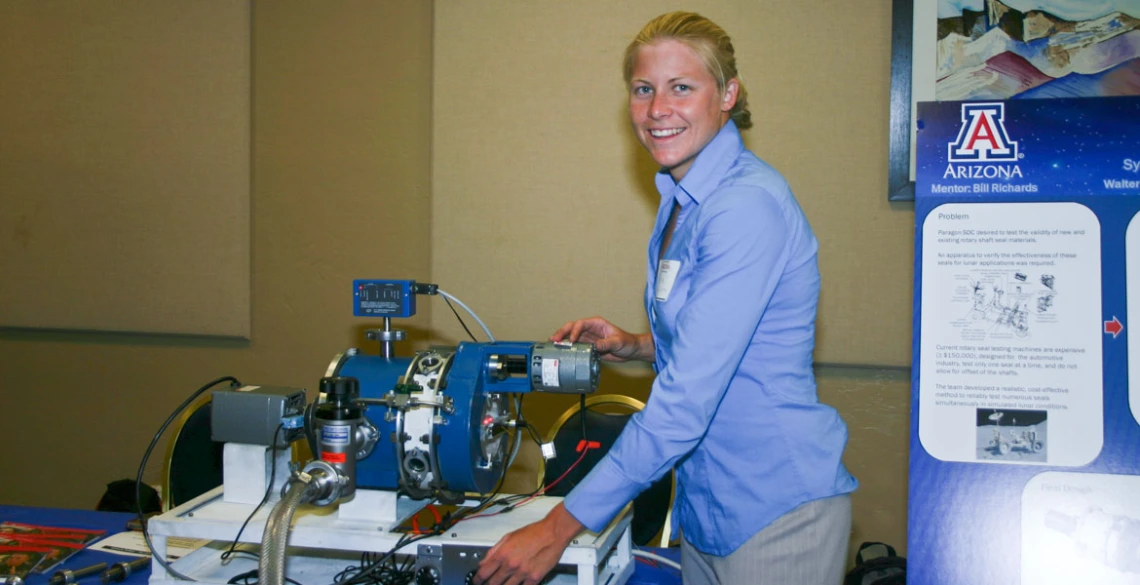Rhodes Trip to Oxford for UA Scholar
Mechanical engineering student Justine Schluntz will skip her master's degree and head to Oxford to study for a doctorate.

Rhodes scholar Justine Schluntz, shown here at Engineering Design Day 2009.
In May 2010, Justine Schluntz graduated summa cum laude with honors with a bachelor’s degree in mechanical engineering. With her eye on a master’s degree, she signed up as a research assistant with department head professor Jeff Jacobs, studying experimental fluid dynamics in the department of aerospace and mechanical engineering.
Then everything changed. In November 2009, Schluntz was selected as a Rhodes Scholar, which means she will skip her master’s and in October 2010 plunge straight into her doctoral studies at Oxford University.
While at Oxford, she will apply her expertise in fluid dynamics as part of the university’s Tidal Energy Research Group, which is based in the department of engineering science and conducts research into generating clean, renewable energy from tidal flows.
Between fielding calls from the press and replying to e-mails from Oxford dons, Schluntz talked to Arizona Engineer Online about her scholarship and intended research area.
Arizona Engineer: Why did you choose the Tidal Energy Research Group?
Justine Schluntz: When I was looking at the Oxford University Web site, the group really stood out for me. It has the fluid dynamics in it, which is what I’m really interested in. And renewable energy, which I think is really important also. When I contacted Dr. Willden,* he was very helpful and seemed like a person who would be great to work with. He sent a lot of articles and papers about tidal energy and was doing anything he could to help. It seemed like the perfect place.
What’s your impression of tidal energy research in the U.K.?
There are several projects looking at tidal energy with different ideas of the best way to do it. Some are actually producing power and connected to the grid. They are experimental, so it’s not a lot of power.
They’re a lot more advanced than we are in the states, which is one of the reasons to go there. In the states we are still questioning if it’s a viable resource, but the UK has come to the conclusion that it is based on the research they’ve done, and now they are starting to see how they can apply it best.
This Oxford group seems to be pushing the boundaries in this area with its research into transverse turbines.
Right. In the beginning, everybody just assumed that tidal power would be similar to wind power, and that an axial turbine would be the best. But you can’t build a huge axial turbine underwater because there’s a lot more pressure. So their idea was to build a transverse turbine, which still had a big surface area to generate a lot of power, but with less force on it.
Presumably, you can build them in a modular fashion, maybe by stringing them together like links in a chain?
Yeah. That’s one of the things they’re looking into. They do a lot of computational fluid dynamics and they model channels and basin flow and try to figure out what the ideal arrangement would be. Some companies are even considering stacking turbines, but you can’t put in too many because you’re going to mess up the flow behind them and then the environment. You also have to be aware of that aspect.
UA is 125 years old in 2010. How does it feel going to a school that’s more than 800 years old?
It’s hard to comprehend the history that’s associated with an institution like Oxford. We have a lot of history here, which you can see from the old photos of the UA that show the campus with just one building in the middle of it. But it was not that long ago – you have to multiply that by six or seven times.
Given your many successes on UA’s swim team, have you looked into joining Oxford’s swim team?
I’ve had some shoulder injuries. I would still like to help out in any way I can and maybe coach a little. But I don’t think that I’ll be competing on the swim team. I don’t think my body will let me.
*Richard Willden, Royal Academy of Engineering research fellow and academic fellow in marine renewable energy at Research Councils UK, working principally on numerical analysis of tidal turbines.

